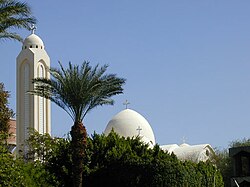Christians worried over having Islamist president
By Ramadan Al Sherbini, Correspondent
7/5/2012
Islamists’ growing clout in Egypt in the wake of a popular revolt, which toppled long-standing president Hosni Mubarak in February last year, has triggered fears among the country’s Christian minority.
Cairo: Although the Church has announced it does not favour a certain contender in Egypt’s coming presidential election, Marina Nadi, a Christian business administration student, is certain that neither she nor her family will vote for any Islamist contestant.
“The Islamist-dominated parliament has done nothing to allay the Copts’ fears about their future in this country. I remember how Salafist (ultra-conservative Muslim) lawmakers refused to observe a minute of silence in memory of Pope Shenouda when he died in March obviously because he was a Christian. So how can I trust Islamists?” she said.
Islamists’ growing clout in Egypt in the wake of a popular revolt, which toppled long-standing president Hosni Mubarak in February last year, has triggered fears among the country’s Christian minority about their freedoms and future role.
The Christians, who account for around 10 per cent of Egypt’s 80 million, have long complained about alleged state discrimination in holding top posts and attacks from the Muslim majority. They say that their status has not improved after the revolution.
“Our places of worship are attacked from time to time amid religious intolerance fuelled by Islamists’ political rise,” said Nadi. “The killers of the Christians outside the television building have not been brought to justice. How will we feel secure if an Islamist takes the presidential helm?” she said, referring to the killing of 27 people, mainly Christian protesters, in clashes with army troops outside state television in Cairo in October.
Thirteen contenders, including three Islamists, are competing in the presidential polls, due to begin on May 23. They include no Christian.
The front-runners are Amr Mousa, a former foreign minister who projects a liberal image; Abdul Moneim Abu Al Fotouh, a dissident from the powerful Muslim Brotherhood; and Mohammad Morsi, the head of the Brotherhood’s Freedom and Justice Party, according to opinion polls.
A recent decision by Salafist groups to support Abu Al Fotouh has apparently alienated potential Christian voters.
“In the beginning, the Christians tilted towards Abu Al Fotouh as a perceived moderate Islamist,” said Mamdouh Mansour, a Coptic activist. “But recently, this tilt has shifted towards Mousa because Abu Al Fotouh has a background of affiliations to the Muslim Brotherhood and the Copts are worried about this,” added Mansour.
The Brotherhood last year expelled Abu Al Fotouh, a medical physician, after he announced his intention to run for president in violation of a ban by the group. In March, the Brotherhood, which holds nearly half of the parliament’s seats, reversed its decision not to field a presidential candidate, triggering accusations of political opportunism and monopoly.
According to Mansour, the Coptic activist, the Christians do not favour Ahmad Shafiq, Mubarak’s last pemier, who is standing for president. “He [Shafiq] has a military background as an ex-army general and there are common fears about having another military president in Egypt. Therefore, most Christian voters agree on Moussa,” argued Mansour.
Since toppling the monarchy in 1952, Egypt has been ruled by military presidents, including Mubarak who was an ex-air force chief.
“Like most Egyptians, the Christians do not take sides in political terms,” said Kamal Zakher, a Coptic writer. “The Church has not intervened to tell its followers to vote for a given candidate. Still, the Copts seem wavering between Mousa and Abu Al Fotouh,” he said.


262524 458432I just added this blog to my rss reader, exceptional stuff. I like your writing style. 695282